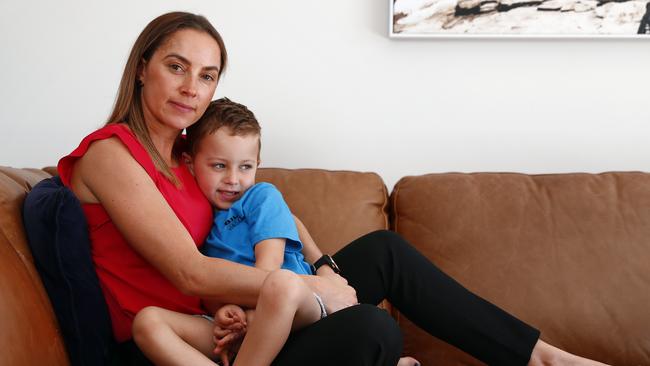Fears for women dealing with miscarriages during COVID-19 pandemic
Every day in Australia, 282 women report a miscarriage with one in four pregnancies ending before 20 weeks. But the pandemic has made the loss even worse, with an early pregnancy loss organisation reporting a 60 per cent increase in the number of requests for help during COVID-19.
NSW
Don't miss out on the headlines from NSW. Followed categories will be added to My News.
- Andrews ‘won’t resign’ despite Minister being ‘thrown under bus’
- Art of political trickery: Dan Andrews is a master of spin
Rhiannon Spargo was nearly 12 weeks pregnant when her doctor gave her the devastating news that her baby was “incompatible with life”.
After already suffering two miscarriages in the previous few years, Mrs Spargo said an ultrasound scan in July confirmed a genetic disorder, Trisomy 18, forcing her to terminate the pregnancy for medical reasons.
“The sonographer put the wand on my belly and the baby was still alive and then she moved down to his abdomen and his insides were on the outside of his belly,” the 32-year-old said.
Mrs Spargo’s heartbreak didn’t end there — COVID-19 hospital restrictions meant her husband wasn’t allowed in during a second operation to remove the pregnancy.
“It was really hard knowing that I had to go in a second time — I just felt like I’d taken a step back and to not have my husband there with me, I just felt really alone and isolated,” the Wollongong mum-of-one said.

Early pregnancy loss organisation, The Pink Elephants Support Network, has reported a 60 per cent increase in the number of requests for help during COVID-19.
The network’s chief executive Samantha Payne said the coronavirus pandemic had “supercharged” demand for services with women suffering alone, in isolation from loved ones.
“I am gravely concerned about the mental health of women who have experienced a miscarriage or a pregnancy after loss journey during COVID and the lasting PTSD, anxiety and depression we are seeing every day,” Ms Payne said.
“Imagine being told your baby has no heartbeat alone in a room with a stranger; imagine waking up from a dilation and curettage without your partner there.
“Miscarriage before the pandemic was in the shadows. It’s the last taboo of women’s health — COVID has heightened this.”
GET MORE CONNECTED:
What you get as a subscriber to The Daily Telegraph
Download our app and stay up to date anywhere, anytime
Ms Payne, a mother-of-two, understands the grief all too well after she suffered her third miscarriage in July.
“When you have a miscarriage now in COVID, you find out by yourself in a scan,” she said.
“I had another one in July and you’re in that room by yourself — you don’t have your husband’s hand to hold on to or your partner’s hand and when you hear those words: ‘I’m sorry there is no heartbeat’, there’s no-one there for you.”
Every day in Australia, 282 women report a miscarriage with one in four pregnancies ending before 20 weeks.
With October marking Pregnancy Loss Awareness Month, Mrs Payne said COVID-19 has highlighted the need for more government funding to support women and teach the public to better understand the impact of miscarriage and know how to help.
“We need everyone to play a role and stand with us to do this,” she said.
For women needing support, visit pinkelephants.org.au
